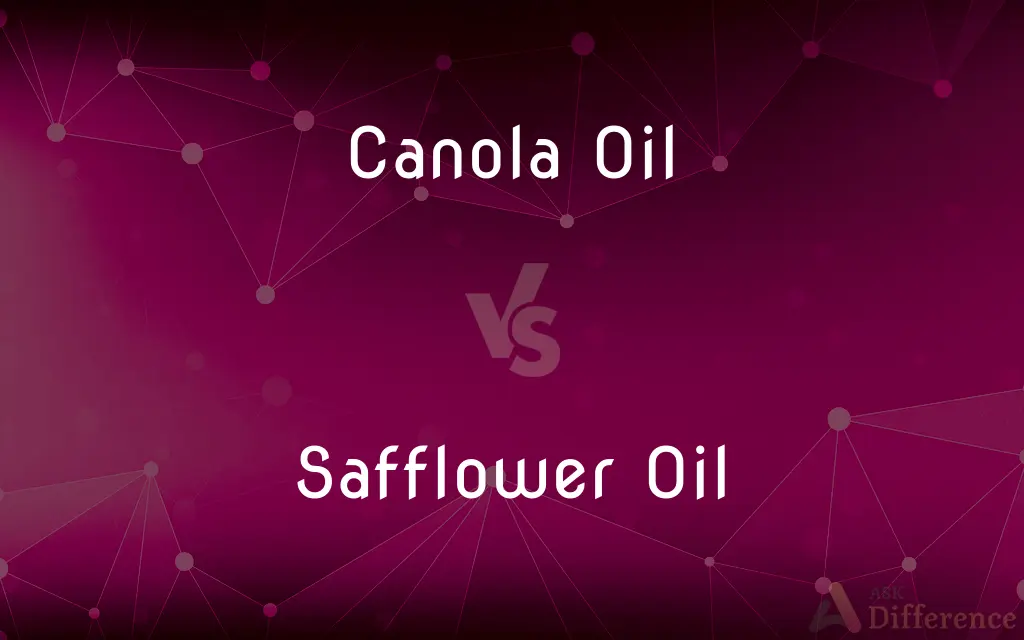Canola Oil vs. Safflower Oil — What's the Difference?
By Tayyaba Rehman & Urooj Arif — Published on February 4, 2024
Canola oil, derived from rapeseed, is known for its low saturated fat, while safflower oil, from safflower seeds, excels in monounsaturated fat content.

Difference Between Canola Oil and Safflower Oil
Table of Contents
ADVERTISEMENT
Key Differences
Canola oil, extracted from the seeds of the canola plant, is renowned for its low saturated fat content and is often used in heart-healthy diets. In contrast, safflower oil is sourced from the seeds of the safflower plant and is highly valued for its high monounsaturated and polyunsaturated fat content, making it a popular choice for those looking to maintain healthy cholesterol levels.
While canola oil boasts a high smoke point, making it suitable for various cooking methods such as frying and baking, safflower oil, particularly the high-oleic variety, also presents a high smoke point, which is ideal for high-heat cooking. However, the linoleic version of safflower oil has a lower smoke point and is more suitable for cold dishes like salads.
Canola oil is often praised for its subtle, mild flavor that doesn't overpower dishes, allowing it to blend seamlessly into recipes. Safflower oil, similarly, has a neutral taste, but some variants may carry a slightly nutty flavor, depending on the processing method and the type of safflower seed used.
In terms of nutritional profile, canola oil is rich in omega-3 fatty acids, contributing to its reputation as a heart-healthy oil. Safflower oil, on the other hand, is abundant in omega-6 fatty acids and vitamin E, offering its own set of health benefits, including supporting immune function.
Canola oil, being a product of the rapeseed plant, has undergone extensive breeding to reduce its erucic acid content, ensuring its safety for consumption. Safflower oil has always been free from this concern, as safflower seeds naturally do not contain erucic acid, making both oils safe and healthy choices for cooking and consumption.
ADVERTISEMENT
Comparison Chart
Source Plant
Derived from rapeseed
Derived from safflower seeds
Main Fat Type
Lower in saturated fat, higher in monounsaturated fat
Higher in monounsaturated and polyunsaturated fats
Smoke Point
High smoke point, versatile in cooking
Varies: high for high-oleic, lower for linoleic type
Flavor
Mild, neutral flavor
Generally neutral, can be slightly nutty
Nutritional Benefits
Rich in omega-3 fatty acids
Rich in omega-6 fatty acids and vitamin E
Compare with Definitions
Canola Oil
Canola oil is rich in monounsaturated fats, contributing to its reputation as a heart-healthy cooking oil.
My dietitian recommended incorporating canola oil into my diet to help manage my cholesterol levels.
Safflower Oil
Safflower oil's high smoke point, especially the high-oleic variety, makes it suitable for high-heat cooking methods.
When I'm deep-frying, I opt for high-oleic safflower oil due to its stability at high temperatures.
Canola Oil
Canola oil is a product of extensive breeding of the rapeseed plant to reduce erucic acid content and ensure safety.
The canola oil in our pantry is not only safe but also a healthy fat option for our family's meals.
Safflower Oil
Safflower oil is a type of oil extracted from the seeds of the safflower plant, notable for its high content of monounsaturated fats.
To maintain a healthy diet, I've started using safflower oil for its beneficial fat profile.
Canola Oil
Canola oil is a vegetable oil derived from the seeds of the canola plant, characterized by its low saturated fat content.
I prefer using canola oil in my recipes because it's healthier and has a neutral taste.
Safflower Oil
Safflower oil is cherished for its neutral flavor, making it an excellent carrier oil for marinades and dressings.
I use safflower oil in my marinades because it doesn't overpower the other flavors in the dish.
Canola Oil
Canola oil is often used as a base for salad dressings and sauces due to its light texture and mild flavor.
For a light and healthy salad dressing, I whisk together canola oil, vinegar, and some herbs.
Safflower Oil
Safflower oil comes in two types, high-oleic and linoleic, each offering distinct benefits and cooking applications.
For my salad dressings, I prefer linoleic safflower oil for its lighter consistency and nutritional properties.
Canola Oil
Canola oil is known for its high smoke point, making it a versatile choice for frying, baking, and sautéing.
When I'm stir-frying vegetables, I reach for canola oil because it can withstand high temperatures without smoking.
Safflower Oil
Safflower oil is a rich source of vitamin E, an antioxidant that supports immune function and skin health.
I include safflower oil in my skincare routine because its vitamin E content helps nourish and protect my skin.
Common Curiosities
Are there any health benefits associated with canola oil?
Yes, canola oil is beneficial for heart health due to its low saturated fat content and rich omega-3 fatty acid profile.
How does the smoke point of canola oil compare to that of safflower oil?
Canola oil has a high smoke point suitable for various cooking methods, while safflower oil's smoke point varies, with high-oleic having a high smoke point and linoleic being lower.
Can canola oil and safflower oil be used interchangeably in recipes?
Yes, both can be used interchangeably in most recipes due to their similar neutral flavors and smoke points, though the choice may depend on the specific dietary fat preference.
What is canola oil?
Canola oil is a vegetable oil extracted from the seeds of the canola plant, known for its low saturated fat content and versatility in cooking.
Is safflower oil a good choice for salad dressings?
Absolutely, safflower oil's neutral taste and healthful fat profile make it ideal for dressings and cold dishes.
Is canola oil suitable for frying?
Yes, canola oil's high smoke point makes it suitable for frying and other high-heat cooking methods.
What is safflower oil?
Safflower oil is a cooking oil obtained from the seeds of the safflower plant, rich in monounsaturated and polyunsaturated fats.
What are the health benefits of safflower oil?
Safflower oil is known for its beneficial fat content, particularly omega-6 fatty acids and vitamin E, which support heart health and immune function.
Can safflower oil be used for frying?
Yes, especially the high-oleic variety of safflower oil, which has a high smoke point suitable for frying.
How should canola oil be stored?
Canola oil should be stored in a cool, dark place, and once opened, it's best to use it within a few months for optimal freshness.
Can canola oil be used in salad dressings?
Yes, canola oil's mild flavor and light texture make it an excellent choice for salad dressings and vinaigrettes.
What is the best way to store safflower oil?
Safflower oil should be kept in a cool, dark location, and similar to canola oil, it should be used within a few months after opening.
Are there any allergens in safflower oil?
Safflower oil is typically free of common allergens, yet individuals with specific dietary restrictions should verify before consumption.
Does canola oil contain any allergens?
Canola oil is generally considered allergen-free, but those with specific food sensitivities should consult with a healthcare provider.
What is the main nutritional difference between canola oil and safflower oil?
Canola oil is higher in omega-3 fatty acids,
Share Your Discovery

Previous Comparison
Ordinal Numbers vs. Nominal Numbers
Next Comparison
3GP vs. 3GPPAuthor Spotlight
Written by
Tayyaba RehmanTayyaba Rehman is a distinguished writer, currently serving as a primary contributor to askdifference.com. As a researcher in semantics and etymology, Tayyaba's passion for the complexity of languages and their distinctions has found a perfect home on the platform. Tayyaba delves into the intricacies of language, distinguishing between commonly confused words and phrases, thereby providing clarity for readers worldwide.
Co-written by
Urooj ArifUrooj is a skilled content writer at Ask Difference, known for her exceptional ability to simplify complex topics into engaging and informative content. With a passion for research and a flair for clear, concise writing, she consistently delivers articles that resonate with our diverse audience.













































